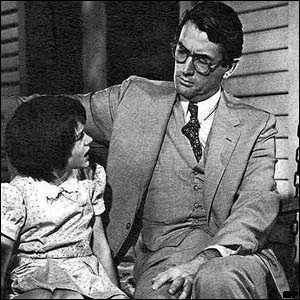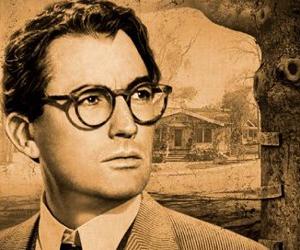To Kill a Mockingbird Quotes
Introduction
To Kill a Mockingbird by Harper Lee is a book which has been quoted from very frequently since its publication in 1960. Below you can find some of the best quotes from To Kill a Mockingbird, along with analyses of selected quotations.Jump to:
Atticus Finch Quotes
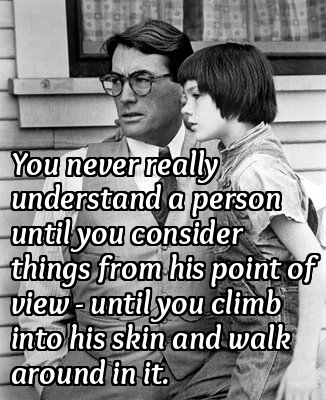
Quote: "You never really understand a person until you consider things from his point of view - until you climb into his skin and walk around in it." - Chapter 3
Analysis: People often make harsh and incorrect judgments about someone without knowing how things really are for that person, just as the people in To Kill a Mockingbird judged Boo Radley negatively and believed false rumors about him. However, it's best to be open minded and consider other viewpoints instead of only our own. Thus we should not judge others without at least first thinking about what it's like to be them. In this famous quote from To Kill a Mockingbird, Atticus demonstrates how we can empathize with others by imagining how we would feel if we were in their situation in life - by metaphorically climbing into their skin and walking around in it. A similar quote by Henry Wadsworth Longfellow is: "If we could read the secret history of our enemies, we should find in each man's life sorrow and suffering enough to disarm all hostility."
Quote: "When a child asks you something, answer him, for goodness' sake. But don't make a production of it. Children are children, but they can spot an evasion quicker than adults, and evasion simply muddles 'em." - Chapter 9
Analysis: A child's curiosity should be fed and encouraged, not stifled. If a person doesn't know the answer to a child's question they shouldn't pretend they do so as to seem smart, or try to change the point so as to avoid looking like they don't know. It's best to be direct and honest and not make the child confused.
Quote: "You might hear some ugly talk about it at school, but do one thing for me if you will: you just hold your head high and keep those fists down. No matter what anybody says to you, don't you let 'em get your goat. Try fighting with your head for a change." - Chapter 9
Analysis: By telling Scout to fight with her head, Atticus is advocating the principle of debate and solving things in the marketplace of ideas, rather than resorting to the principle of "might is right" (i.e., using physical force or violence). He is also trying to teach Scout to control her temper and not let others get the better of her by making her angry. Scout eventually learns to follow Atticus' advice. For example, she later disperses the lynch mob outside the jail just through talking to them.
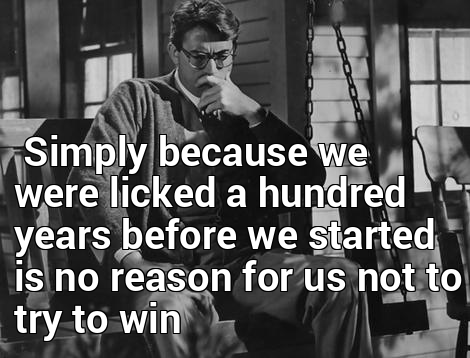
Analysis: Here Atticus is saying that even if there is no chance of victory they will still fight for justice. For in Atticus' view, a person must still do the right thing, even when faced with a situation where he cannot succeed.
Quote: "Shoot all the bluejays you want, if you can hit 'em, but remember it's a sin to kill a mockingbird." - Chapter 10
Analysis: Mockingbirds are symbols of innocence because they do no harm and instead sing beautifully for the enjoyment of others. Atticus therefore thinks it's a sin to kill a mockingbird because they hurt no one and only help people. The mockingbird symbolizes Tom Robinson who generously helped people and was innocent of doing any harm to others as he'd been accused of. His death near the end of the book is the killing of a mockingbird that the book's title refers to.
Quote: "They're certainly entitled to think that, and they're entitled to full respect for their opinions... but before I can live with other folks I've got to live with myself. The one thing that doesn't abide by majority rule is a person's conscience." - Chapter 11
Analysis: A person should respect other people's opinions but also be true to oneself. This means doing what one believes is right instead of just going with the flow.
Quote: "I wanted you to see what real courage is, instead of getting the idea that courage is a man with a gun in his hand. It's when you know you're licked before you begin, but you begin anyway and see it through no matter what." - Chapter 11
Analysis: Carrying a gun does not make a man brave. Courage is when you face impossible odds and still try anyway.
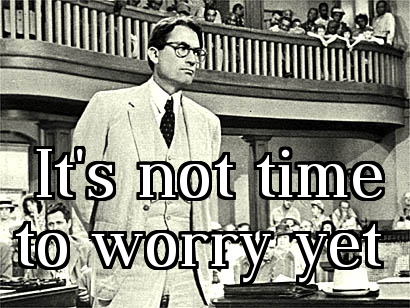
Analysis: Here Atticus is saying to keep calm, don't panic and that they'll cross that bridge when they come to it.
Quote: "Our courts have their faults, as does any human institution, but in this country our courts are the great levellers, and in our courts all men are created equal." - Chapter 20
Analysis: Here Atticus is describing the principles of blind justice and equality under the law. Courts should decide cases objectively without favoring any race or gender, for example.
Quote: "The one place where a man ought to get a square deal is in a courtroom, be he any color of the rainbow, but people have a way of carrying their resentments right into a jury box." - Chapter 23
Analysis: It is mandatory for a person to receive equal treatment under the law, however a prejudiced jury can still deny a person justice and destroy this ideal.
Quote: "As you grow older, you'll see white men cheat black men every day of your life, but let me tell you something and don't you forget it - whenever a white man does that to a black man, no matter who he is, how rich he is, or how fine a family he comes from, that white man is trash." - Chapter 23
Analysis: No matter a person's status or race, if they are racist or unscrupulous then they are still a bad person.
Quote: "Atticus, he was real nice"
"Most people are, Scout, when you finally see them." - Chapter 31
Analysis: Here Scout is talking to Atticus about how Boo Radley turned out to be a very nice person, despite her originally thinking he was a monster. Atticus points out that most people turn out to be good once you get to know them and that it's usually prejudging people without knowing them that makes you dislike others.
Scout Finch Quotes
To Kill a Mockingbird is told from the perspective of a grown-up Scout looking back at her childhood and narrating. Therefore the quotes below attributed to Scout are both the quotes said by Scout as a child in To Kill a Mockingbird and the quotes said by the book's narrator.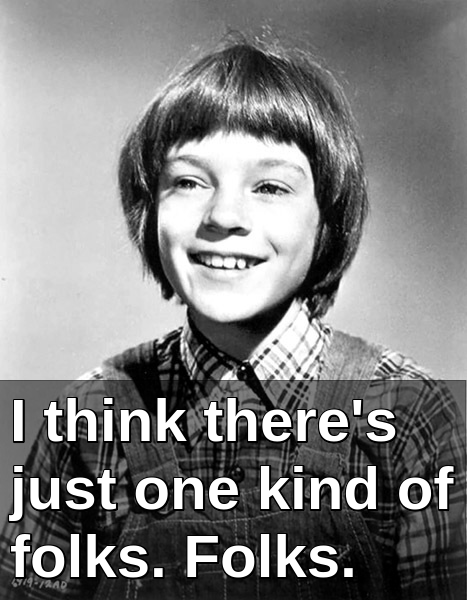
Analysis: Often we don't appreciate something until it's gone or until we are close to losing it. Scout demonstrates this by referring to breathing because it is something we take for granted, yet if we could no longer breathe we would certainly miss it.
Quote: "Atticus told me to delete the adjectives and I'd have the facts." - Chapter 7
Analysis: Adjectives can be used to spin the meaning of sentences. But by ignoring them you can get to the essential meaning and bare points of passages of text. A similar quote, attributed to Voltaire, is: "The adjective is the enemy of the substantive."
Quote: "I asked him to pass the damn ham, please" - Chapter 9
Quote: "I was born good but had grown progressively worse every year." - Chapter 9
Quote: "It was times like these when I thought my father, who hated guns and had never been to any wars, was the bravest man who ever lived." - Chapter 11
Quote: "With him, life was routine; without him, life was unbearable." - Chapter 12
Quote: "Atticus had said it was the polite thing to talk to people about what they were interested in, not about what you were interested in." - Chapter 15
Analysis: It is good manners to be considerate of other people and take an interest in what they care about instead of just pushing your own interests on them.
Quote: "I think there's just one kind of folks. Folks." - Chapter 23
Analysis: We should not believe that other people are so different to us just because because they are of another race, like Tom Robinson, or because we do not know them well, like Boo Radley. It's better to have an inclusive attitude than an "us vs them" mindset.
Quote: "One time Atticus said you never really knew a man until you stood in his shoes and walked around in them." - Chapter 31
Analysis: This quote underlines the value of empathy, a frame of mind that speaks of compassion towards other people and understanding of what they are going through in life.
Jem Finch Quotes
Quote: "Atticus says you can choose your friends but you sho' can't choose your family, an' they're still kin to you no matter whether you acknowledge 'em or not, and it makes you look right silly when you don't." - Chapter 23Quote: "If there's just one kind of folks, why can't they get along with each other? If they're all alike, why do they go out of their way to despise each other? Scout, I think I'm beginning to understand something. I think I'm beginning to understand why Boo Radley's stayed shut up in the house all this time... it's because he wants to stay inside." - Chapter 23
Analysis: Jem couldn't understand why people would want to have hatred and prejudice towards each other. Thus he began to see why Boo Radley would want to stay inside his home to get away from people who harbored these kinds of sentiments.
Miss Maudie Quotes
Quote: "There are just some kind of men who - who're so busy worrying about the next world they've never learned to live in this one, and you can look down the street and see the results." - Chapter 5Analysis: Some people are more interested in worrying about religion and keeping religious rules than they are about caring about the lives and well-being of the people around them. This can lead to the kind of problems we see in the world around us.
Quote: "You are too young to understand it ... but sometimes the Bible in the hand of one man is worse than a whiskey bottle in the hand of - oh, of your father." - Chapter 5
Analysis: Religiosity in some people can lead to injustices and bad outcomes because of the way bad people can interpret the Bible and use it for their own aims. This can have a worse effect on the world than even something as bad as alcoholism in a good person.
Quote: "Mockingbirds don't do one thing but make music for us to enjoy. They don't eat up people's gardens, don't nest in corncribs, they don't do one thing but sing their hearts out for us. That's why it's a sin to kill a mockingbird." - Chapter 10
Quote: "People in their right minds never take pride in their talents." - Chapter 10
Analysis: It is sensible for a person to be humble and modest rather than being proud.
Quote: "Whether Maycomb knows it or not, we're paying the highest tribute we can pay a man. We trust him to do right. It's that simple." - Chapter 24
Analysis: Atticus was seen as a man who would objectively pursue justice without prejudice. This is one of the noblest qualities a person can have.
By Ben Wagner and Leann Zarah
First published: 2006, Last updated: June 8, 2024



